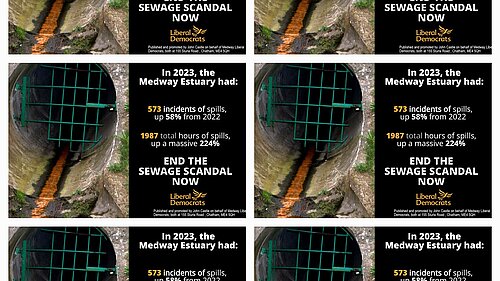Even More Sewage Dumped into the River Medway

Today the Environment Agency released the figures how much potential sewage was been dumped into our rivers and beaches last year, and it doesn’t look good for the River Medway. According to their data, we saw 573 discharges into the River Medway estuary, an increase of 58% from last year. They also show that these discharges lasted for a total of 1986.92 hours, a massive increase of 224%.
This has all happened despite claims by the Conservative government that it is doing all that it can to clean up our river. Our very own MP for Rochester & Strood Kelly Tolhurst said on the 26th January last year, ‘I campaigned on sewage reduction’ and that the Medway Lib Dems ‘Clearly have no idea what’s going on with the River Medway!’. Sadly, it seems our fears were correct.
Meanwhile, the Liberal Democrats have a clear plan to halt the sewage dumping and protect our waterways.
• Ending Sewage Dumping: Set meaningful targets and deadlines or water companies to end sewage discharges.
• Sewage Tax: Introduce a tax on water company profits to fund the cleanup of waterways.
• Robust regulation: Abolish Ofwat and establish a new 'Coastal, Rivers and Lakes Authority' with strengthened regulatory powers to issue fines to the top executives of water companies and initiate prosecutions in extreme cases.
• Reform water companies: Turn water companies into public benefit companies so that particular economic and environmental policy objectives must be considered.
• Increase monitoring: End the current system of “self-monitoring” and ensure unannounced spot checks are part of the new regulatory framework. Mandate that new monitors cover designated bathing waters and sites of environmental importance such as SSSIs.
• Local Empowerment: Give Local authorities increased powers to hold water companies accountable, with new water boards and catchment partnerships.
• Protecting Citizens: Extend the Freedom of Information Act to cover water companies and introduce a new 'Sewage Illness Victim Compensation Scheme'. Permit citizens, charities and other groups to take water companies to court.
• Promoting Transparency: Require consumer representatives to be included on water company boards, and ensure bills clearly show where money is spent. Make water companies fund local environmental reporters.
• Investment and Innovation: Water companies will have 25-year investment plans, including nature-based solutions and innovative approaches to water management.
• Clean swims: Increase the number of designated bathing water sites to 1,500 by 2030. Set legally binding targets to prevent sewage dumping into bathing waters and highly sensitive nature sites.
• Eliminating water poverty: Create a new water social tariff, aiming to eliminate water poverty by the end of the next parliament. Ensure that energy retrofitting programmes also include measures to improve water resilience and cut bills.
Graham Colley, Lib Dem candidate for Rochester & Strood, said ‘Today’s data shows that the government hasn’t got to grip with the sewage scandal. We have seen a tripling of the amount of time potential raw sewage is being dumped in our river. It can be no surprise that we found e-coli in the water. Enough is enough, we must stop this practice as soon as we can.’
Medway Liberal Democrats also call on the Environment Agency and Southern Water to start regularly testing the water in Medway for e-coli and other dangerous pollutes, therefore showing it is safe for the clubs and businesses that rely on the river.
